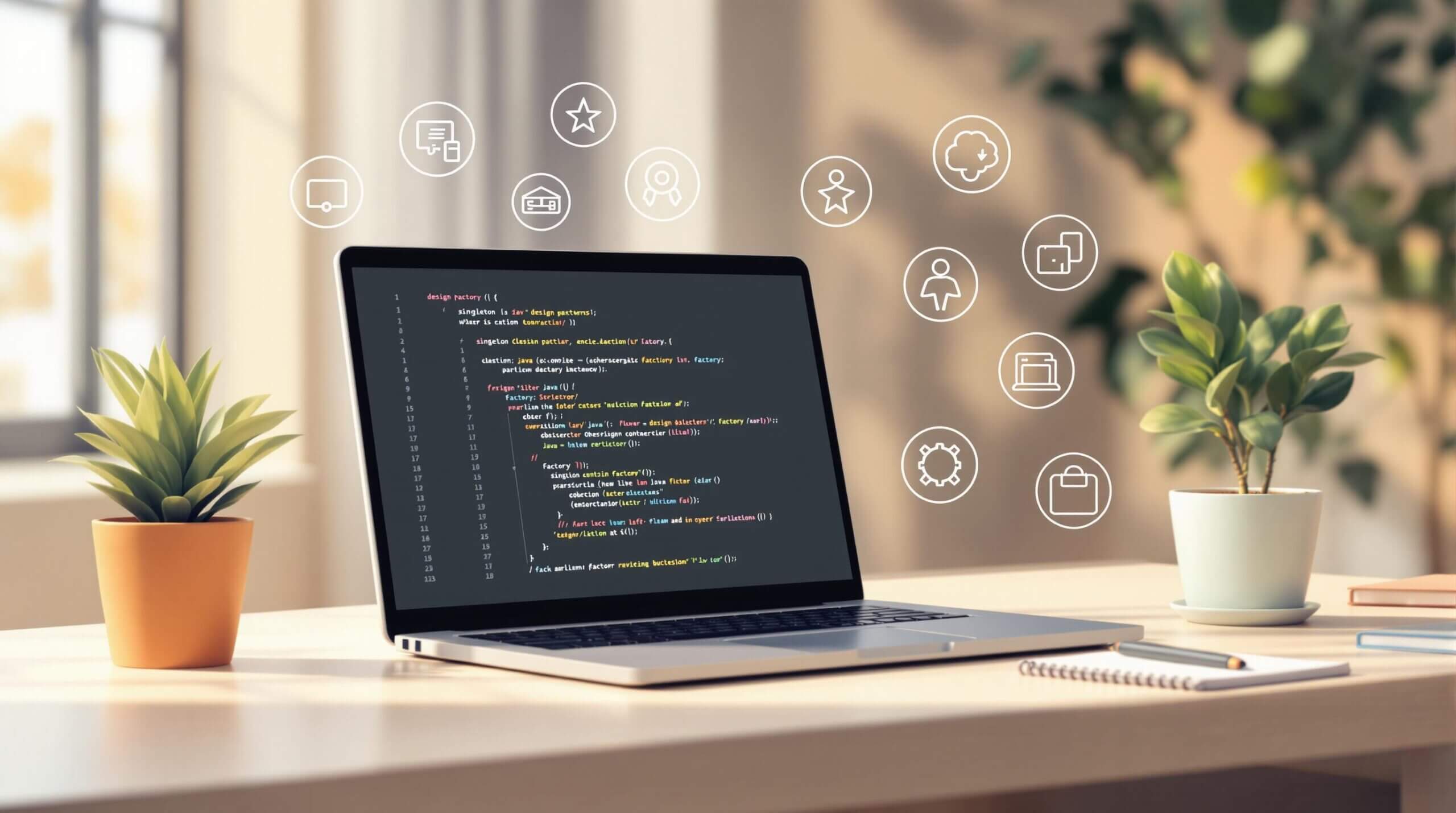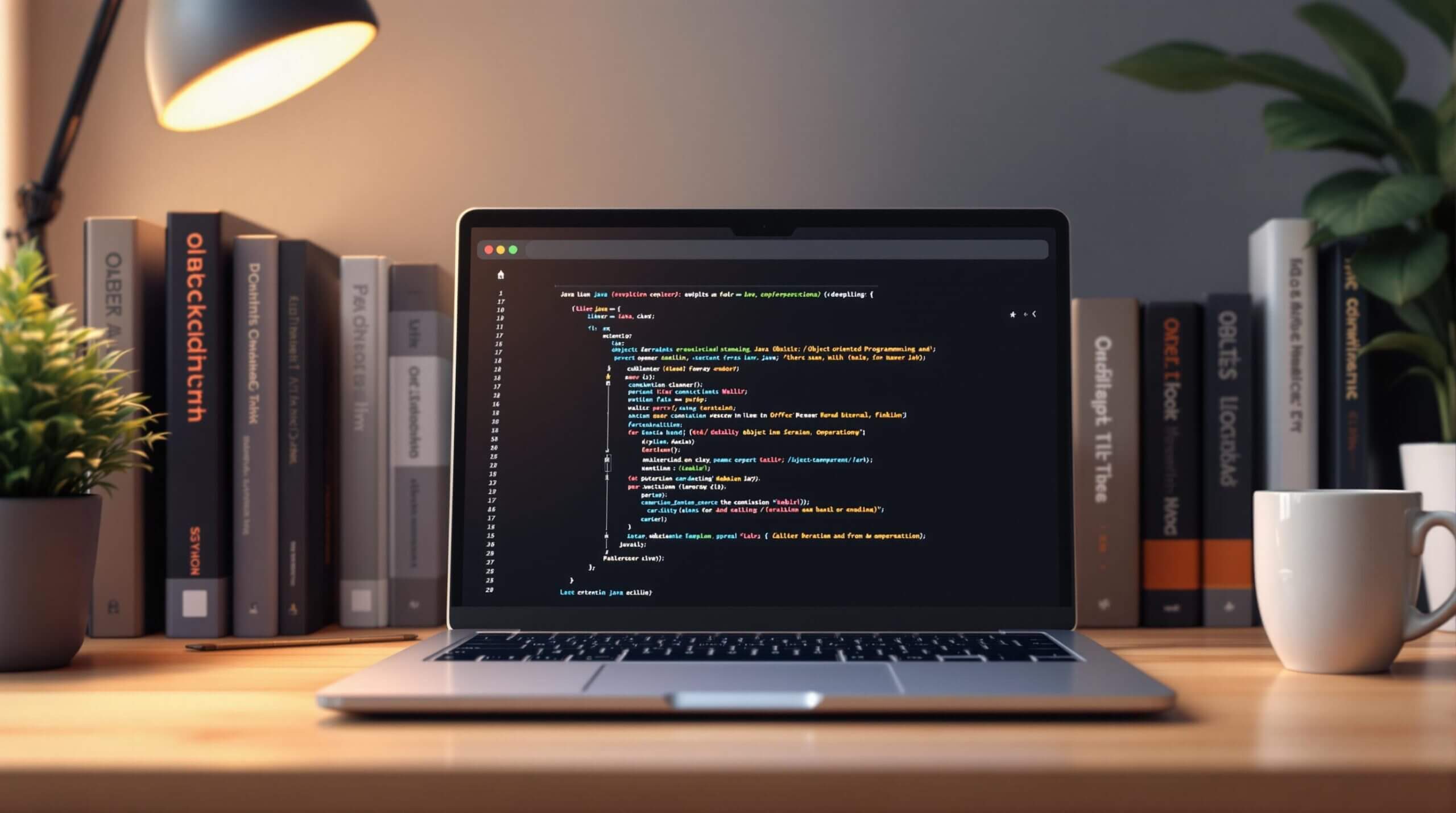Want to ace Java coding interviews? Focus on these essentials:
- Master Core Concepts: Data structures (arrays, linked lists, trees), algorithms (sorting, searching), and object-oriented programming (inheritance, polymorphism).
- Problem-Solving Skills: Break problems into smaller parts, handle edge cases, and prioritize readability, efficiency, and scalability in your code.
- Java-Specific Features: Practice Java 8+ functionalities like lambda expressions, Stream API, and concurrency tools.
- Practice Regularly: Use platforms like LeetCode and HackerRank to solve common problems such as reversing a linked list or finding the longest substring without repeats.
- Communicate Clearly: Explain your thought process, justify data structure choices, and document your code effectively.
Quick Tip: Start with a working solution, then optimize for time and space complexity. Use debugging tools like IntelliJ IDEA to refine your code.
Java coding challenges test both your technical skills and how well you explain your approach. Let’s dive deeper into strategies to succeed!
LeetCode Was Hard Until I Learned THESE 8 Patterns (With Templates!)
What to Expect in Java Coding Challenges
Java coding challenges during technical interviews assess various aspects of your programming skills. Knowing what to expect can help you prepare thoroughly.
Types of Coding Problems
These challenges often simulate tasks like optimizing database queries or designing scalable APIs, giving you a sense of what real-world tasks might look like:
| Category | Examples | Skills Tested |
|---|---|---|
| Algorithms | Sorting, searching, graph traversal | Optimizing time and space complexity |
| Data Structures | Arrays, linked lists, trees, graphs | Implementing and manipulating structures |
| Object-Oriented Programming | Design patterns, inheritance scenarios | Applying system design and object-oriented principles (e.g., SOLID) |
| Performance Optimization | Caching, memoization | Managing resources and improving efficiency |
Challenges tend to become more difficult as the interview progresses. Having a strong grasp of these problem types will prepare you for a variety of scenarios, from conceptual questions to hands-on coding tasks.
"Problem-solving is critical in Java development, requiring debugging, issue resolution, and navigating complex logic."
What Interviewers Evaluate
Interviewers look at multiple aspects of your solution, including how well you write and structure your code.
Code Quality Metrics:
- Readability: Use clear variable names, proper indentation, and a clean structure.
- Efficiency: Select the right data structures and algorithms for optimal performance.
- Robustness: Account for edge cases and include proper error handling.
- Maintainability: Write code that’s easy to update and extend.
Problem-Solving Approach: Your ability to break down problems and analyze requirements is just as important as your coding. Interviewers will observe how you:
- Weigh different solutions and explain their pros and cons.
- Address edge cases and anticipate errors.
- Refine your initial solution to improve performance.
Top tech companies value candidates who balance solid coding skills with analytical thinking and clear communication. Your approach – how you choose data structures, handle performance, and explain your assumptions – can be just as critical as the final code itself [2][3][4].
With this understanding of problem types and evaluation criteria, you’re ready to dive into strategies for tackling these challenges.
Problem-Solving Strategies for Java Challenges
Breaking Down the Problem Statement
To tackle Java challenges effectively, start by breaking the problem into manageable parts. This helps you understand the requirements and constraints clearly, whether you’re working with algorithms, data structures, or object-oriented design.
| Analysis Step | Key Focus Areas | Expected Outcome |
|---|---|---|
| Input Analysis | Types of data, boundaries, ranges | Defined input parameters |
| Output Requirements | Format, precision | Clear success criteria |
| Constraints | Time and space limitations | Performance goals |
| Edge Cases | Null inputs, boundary values | Comprehensive solution scope |
"Mastering Java fundamentals and breaking problems into smaller parts is often more valuable than memorizing advanced algorithms." [1]
Once you’ve broken the problem down, focus on creating a functional solution first. You can refine it for performance later.
How to Optimize Solutions Effectively
Begin with a solution that works, then refine it for efficiency. Follow the principle: "Make it work, make it right, make it fast."
Time Complexity Improvements:
- Use optimized data structures like HashMaps for quicker lookups.
- Opt for
StringBuilderover string concatenation for better performance during string manipulations.
Reducing Space Complexity:
- Implement in-place algorithms when feasible.
- Free up memory by nullifying unused objects or closing resources.
- Choose primitive types over wrapper classes when applicable.
While optimization is essential, explaining your thought process is just as critical, especially in interview scenarios.
Explaining Your Approach Clearly
Presenting your solution effectively is key to showcasing your skills. Focus on both your technical reasoning and methodology:
- State assumptions to clarify your understanding of the problem.
- Outline a high-level approach before diving into specifics.
- Justify your data structure choices, weighing the pros and cons of alternatives.
Organize your explanation to make it easy to follow, especially during live coding sessions.
Code Documentation Tips:
- Use comments to clarify complex logic.
- Note any limitations in your solution.
- Include a brief analysis of time and space complexity.
Clear documentation not only strengthens your code but also highlights your professionalism and attention to detail.
Java Concepts to Focus On
Technical interviewers at top companies often test both core and advanced Java knowledge. Knowing what to focus on can make your preparation much more effective.
Core Java Topics to Know
These are the building blocks of Java and frequently appear in coding challenges:
| Core Topic | Key Areas | Common Uses |
|---|---|---|
| Object-Oriented Programming | Inheritance, Polymorphism, Encapsulation | System design, organizing code |
| Arrays & Strings | Manipulation, Search Operations | Algorithm-based problems |
| Exception Handling | Try-with-resources, Custom Exceptions | Writing reliable, error-free code |
When working on these, aim for code that’s easy to read and maintain. For instance, using try-with-resources ensures efficient resource management and cleaner exception handling.
Advanced Java Topics to Learn
For modern Java interviews, advanced concepts often come into play, testing your deeper understanding of the language:
Collections Framework
- Know how ArrayList, LinkedList, and Vector differ.
- Learn the inner workings of HashMap.
- Use TreeSet to handle sorted, unique elements.
Multithreading and Concurrency
- Understand thread creation and lifecycle.
- Use synchronization techniques to avoid race conditions.
- Study how to prevent deadlocks effectively.
Java 8+ Features
- Practice lambda expressions and the Stream API for concise and functional data handling.
- Explore CompletableFuture for handling asynchronous tasks efficiently.
Hands-on practice with these topics is key. Apply them to real-world scenarios to meet the expectations of technical interviewers at major companies [1][3].
sbb-itb-f454395
Practicing Java Problems Effectively
Succeeding in Java coding interviews takes focused practice with tough problems and smart use of development tools. Leading tech companies often assess candidates with both basic and advanced Java challenges [3].
Sample Problems with Solutions
Here are some common problem types to prioritize during your practice:
| Problem Category | Example Problem | Key Concepts |
|---|---|---|
| Data Structures | Reversing a Linked List | Pointers, Memory Management |
| String Manipulation | Longest Substring Without Repeats | Hash Tables, Two-Pointer Technique |
| Algorithm Optimization | Binary Search Implementation | Time Complexity, Space Efficiency |
Start by analyzing the problem thoroughly to understand the requirements before diving into the code. For example, here’s how you could reverse a linked list:
public ListNode reverseList(ListNode head) {
ListNode prev = null;
ListNode current = head;
while (current != null) {
ListNode next = current.next;
current.next = prev;
prev = current;
current = next;
}
return prev;
}
Using IDEs and Debugging Tools
Development tools like IntelliJ IDEA and Eclipse can make interview prep more effective [2]. Take advantage of features like breakpoints, watch expressions, and step-by-step execution to debug your code. Tools such as code completion and memory monitoring can also help you refine your solutions.
Being proficient in debugging not only improves your code but also shows your ability to solve problems and optimize solutions – skills that are highly valued in any Java developer.
"Pro tip: While debugging, practice explaining your thought process aloud. This helps you build the ability to clearly articulate your solutions during interviews."
Tips to Build Confidence for Interviews
After mastering Java problem-solving basics, it’s time to focus on building confidence through targeted preparation. Companies like Amazon often rely on challenging coding exercises to assess Java programming skills [3].
Practice with Mock Interviews
Mock interviews are a great way to prepare for real-world interview scenarios. Platforms like LeetCode and HackerRank offer Java-focused challenges that mimic the difficulty and structure of technical interviews at top tech companies.
| Practice Focus | Why It Matters | How to Approach It |
|---|---|---|
| Time Management | Mimics real interview pacing | Set a 45-minute timer per problem |
| Code Quality | Improves solution clarity | Write clean, efficient code |
| Communication | Boosts interview presence | Explain your thought process clearly |
Keep Learning and Improving
Set aside 2-3 hours daily to tackle a mix of Java problems, explore various solutions, and stay informed about the latest updates in Java. This consistent effort not only sharpens your technical skills but also builds confidence.
Key Areas to Focus On:
- Strengthen your understanding of Java fundamentals like data structures, algorithms, and object-oriented programming (OOP).
- Familiarize yourself with recent Java updates and industry best practices.
- Use debugging tools effectively to refine and improve your code.
Confidence grows with consistent practice and a solid grasp of Java’s core principles. By dedicating time to learning and problem-solving, you’ll be ready to handle any Java interview with ease.
Conclusion: Steps to Succeed in Java Interviews
Preparing for Java coding interviews requires a focused approach. Here’s a quick guide to help you get ready:
| Key Area | Focus Points | How to Practice |
|---|---|---|
| Technical Knowledge | Core Java, Data Structures | Daily practice of foundational topics |
| Problem-Solving | Algorithms, Solution Design | Use platforms like LeetCode, HackerRank |
| Communication | Explaining Code, Sharing Approaches | Mock interviews, Peer feedback |
Start by mastering Java fundamentals like data structures, OOP principles, and collections – these are the building blocks for solving interview problems [1]. If you’re aiming for senior roles, dive into advanced topics such as concurrency and design patterns. Keeping up with the latest Java updates can also help showcase your dedication to staying sharp in your field.
When tackling coding problems, break them into smaller parts, identify constraints, and write clean, testable code. This not only highlights your analytical abilities but also ensures your solutions are solid [5]. Before jumping into coding, sketch out your ideas and test them manually. This step-by-step approach shows interviewers that you’re thorough and methodical.
Clear communication is just as important as technical skills [4]. Practice explaining your logic while coding. This helps interviewers follow your thought process and see how you approach problems. By blending strong technical skills with clear communication, you’ll be ready to handle any Java interview.
"The ability to articulate technical concepts clearly and explain complex solutions succinctly is essential for demonstrating both problem-solving skills and communication abilities in Java interviews" [4].
FAQs
Let’s dive into some common questions about preparing for Java coding interviews and strategies to excel.
How to solve LeetCode problems in Java?
To tackle LeetCode problems effectively, follow a structured approach like UMPIRE: Understand the problem, identify patterns, plan your solution, implement clean code, and review for improvements. Breaking it down:
| Phase | Purpose |
|---|---|
| Problem Analysis | Clarify the problem requirements and limits |
| Solution Design | Pick the right data structures and algorithms |
| Implementation | Write clean, efficient code |
| Optimization | Test edge cases and refine performance |
Instead of memorizing solutions, focus on understanding the logic and patterns behind them. This will help you adapt similar techniques to solve new problems [1] [2].
How to clear a Java technical interview?
Excelling in a Java technical interview requires both technical skills and strong communication. Here’s what to focus on:
Key Problem-Solving Patterns in Java:
- Sliding Window: Great for substring problems, like finding the longest substring without repeating characters.
- Two Pointers: Useful for array tasks, such as finding pairs that sum to a target.
- Fast and Slow Pointers: Ideal for detecting cycles in linked lists.
- Backtracking: Perfect for combinatorial problems, like generating permutations.
Beyond coding, emphasize your thought process by:
- Asking questions to clarify requirements.
- Discussing trade-offs and alternative solutions.
- Explaining your design decisions, especially for advanced topics like concurrency or Java 8+ features [1] [3].
"Complex Java interview questions often require candidates to articulate sophisticated ideas succinctly and clearly" [4].
Strong communication is just as important as technical skills. When explaining your approach, focus on why you made specific choices and how they align with Java best practices [3].
With consistent practice and these strategies, you’ll approach Java coding interviews with confidence.





